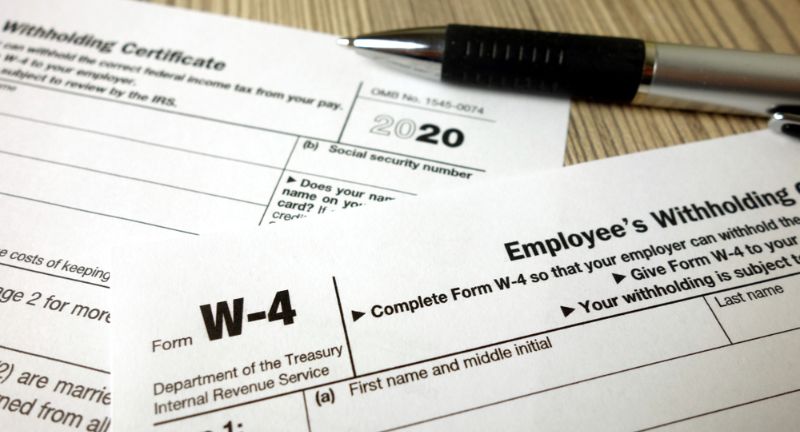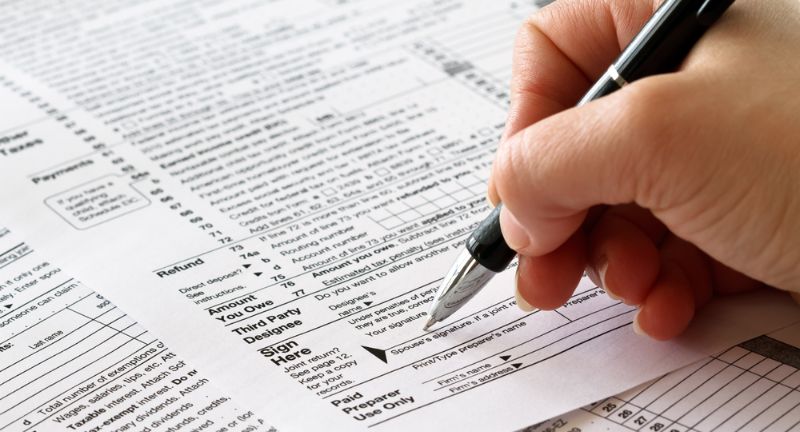LIFE
Avoid Tax Time Stress With These 25 Expert Tips
Published
2 weeks agoon

Shutterstock
Tax season can be a stressful time, but having the right knowledge can make all the difference. Your tax accountant is a treasure trove of information that can save you time, money, and frustration. Understanding their insights helps you avoid costly mistakes and take advantage of available deductions and credits. From keeping your records organized to planning your taxes year-round, these tips empower you to navigate the process with confidence. Let’s explore 25 key things your tax accountant wishes you knew to make this tax season your smoothest yet.
Keep Records Organized

Shutterstock
Keeping accurate and organized financial records throughout the year is essential for a smooth tax filing process. It allows your tax accountant to work efficiently, ensuring no deductions or credits are overlooked. Good record-keeping reduces the risk of audits and errors in your tax return. Use tools like spreadsheets or accounting software to keep track of income, expenses, and receipts in real time.
Understand Taxable vs. Nontaxable Income

Shutterstock
Not all income is treated equally for tax purposes, and understanding the differences can save you headaches. Taxable income includes wages, freelance earnings, and investment profits, while nontaxable income might include gifts or certain insurance payouts. Knowing what to report ensures compliance and avoids penalties. If you’re ever in doubt, consult with your tax accountant for clarification on specific income sources.
Track Charitable Contributions

Shutterstock
Charitable donations can provide valuable tax deductions if properly documented. Keep receipts and written acknowledgment from the organizations you donate to, including non-cash contributions like clothing or household goods. Accurately tracking these contributions ensures you can claim the maximum allowable deduction. This small effort can lead to significant savings on your tax bill.
Maximize Retirement Contributions

Shutterstock
Contributing to retirement accounts like IRAs or 401(k)s reduces your taxable income while helping you build a secure future. Many contributions are tax-deferred, meaning you won’t pay taxes until you withdraw funds during retirement. Take advantage of employer matching programs to maximize your savings. Discuss with your accountant to ensure you contribute the maximum allowed within IRS limits.
Small Expenses Add Up

Shutterstock
Overlooking small deductible expenses can cost you significant savings over time. Items like mileage, home office supplies, or professional dues may seem minor but can add up to substantial deductions. Make it a habit to track and record even the smallest eligible expenses. By providing these details to your tax accountant, you maximize your deductions and minimize your taxable income.
Stay Informed About Tax Law Changes

Shutterstock
Tax laws are constantly evolving, and staying updated can help you plan better and avoid penalties. Changes in tax rates, deductions, and credits might impact your financial decisions significantly. Ignorance of new laws could lead to missed opportunities for tax savings. Consult with your accountant periodically to understand how changes affect your unique financial situation.
Separate Business and Personal Finances

Shutterstock
Mixing personal and business finances can make tax preparation a nightmare and may lead to lost deductions. Open separate bank accounts and credit cards for business transactions to keep records clean and easy to track. This practice simplifies filing taxes and ensures you can accurately report income and expenses. It also minimizes the risk of audits or penalties for misreported deductions.
Home Office Deduction Isn’t a Red Flag

Shutterstock
Many people avoid claiming a home office deduction, fearing it will trigger an audit. However, if you meet the IRS criteria, it’s a legitimate and beneficial deduction. Document the portion of your home exclusively used for business to calculate your deduction accurately. Your tax accountant can help ensure you claim this without crossing into red flag territory.
Report All Income

Shutterstock
Failing to report all your income, including freelance or side gig earnings, can result in penalties and interest from the IRS. Many third-party platforms report payments to the IRS, so underreporting is risky. Keeping thorough records of all income ensures accuracy and compliance. Transparency with your tax accountant will help you avoid unnecessary legal and financial trouble.
Save for Estimated Taxes

Shutterstock
If you’re self-employed or have income not subject to withholding, setting aside money for quarterly estimated tax payments is crucial. Missing these payments can result in penalties and a hefty tax bill at the end of the year. Work with your tax accountant to calculate accurate quarterly payments. Consistently saving a portion of your income avoids surprises when taxes are due.
Take Advantage of Tax Credits

Shutterstock
Tax credits are powerful tools that directly reduce your tax liability, unlike deductions, which lower taxable income. Credits like the Earned Income Tax Credit or Child Tax Credit can save you thousands of dollars. Eligibility criteria can vary, so consult your tax accountant to ensure you’re claiming all applicable credits. Don’t leave money on the table by overlooking these opportunities.
Don’t Wait Until the Last Minute

Shutterstock
Procrastination during tax season can lead to unnecessary stress and missed opportunities for savings. Starting early gives your accountant the time needed to find and optimize deductions and credits. Last-minute filings may result in errors or overlooked details that could cost you money. Be proactive and set a deadline well before the tax season rush to ensure a hassle-free process.
Review Your W-4 Regularly

Shutterstock
Your W-4 determines how much tax is withheld from your paycheck, and reviewing it regularly can prevent surprises at tax time. Changes in your life, such as marriage, having children, or starting a second job, can affect your tax liability. Adjusting your W-4 ensures you’re not overpaying or underpaying taxes throughout the year. Your tax accountant can guide you on the appropriate withholding level for your situation.
Medical Expenses May Be Deductible

Shutterstock
If your medical expenses exceed a certain percentage of your income, they may qualify as a tax deduction. These include doctor visits, prescription medications, and even medical travel costs. Keeping detailed records of all medical expenses can help you claim this deduction effectively. Speak with your tax accountant to understand the eligibility criteria and maximize your benefits.
Be Honest and Transparent

Shutterstock
Honesty is the best policy when working with your tax accountant. Providing incomplete or false information can lead to audits, penalties, and legal trouble. Your accountant is there to help, not judge, so share all relevant financial details. Transparency ensures accurate filings and reduces the risk of complications down the line.
Audit Triggers Are Often Random

Shutterstock
While certain behaviors may increase the likelihood of an audit, many are selected randomly by the IRS. Even honest taxpayers can be audited, so don’t panic if it happens to you. Keeping meticulous records and working with a tax accountant ensures you’re prepared for any questions the IRS might ask. Audits are often straightforward when your documentation is in order.
Mileage Logs Are Crucial

Shutterstock
If you claim a deduction for business-related driving, a detailed mileage log is essential. Record the date, destination, purpose, and miles driven for each trip to substantiate your claim. The IRS requires this documentation to approve mileage deductions. Digital tools and apps make tracking mileage easier than ever, ensuring you’re prepared if audited.
Education Credits and Deductions Help

Shutterstock
Education-related expenses can provide significant tax savings through credits and deductions. The American Opportunity Credit and Lifetime Learning Credit are two common examples that reduce your tax liability. Eligible expenses include tuition, books, and required supplies. Talk to your tax accountant to determine which education tax benefits apply to your situation.
Review Tax Forms Before Signing

Shutterstock
Always review your tax return thoroughly before signing and submitting it. Mistakes or omissions can lead to audits or delays in receiving your refund. Your accountant is skilled, but it’s your responsibility to ensure all information is accurate. Double-checking helps you catch errors and ensures peace of mind during tax season.
Investments Have Tax Implications

Shutterstock
Selling stocks, mutual funds, or other investments can have tax consequences, such as capital gains taxes. Understanding the tax implications of your investment activities helps you plan better. Holding investments for more than a year often results in lower tax rates compared to short-term gains. Your accountant can provide strategies to minimize taxes on your investment income.
State Taxes Vary Widely

Shutterstock
State taxes can differ significantly depending on where you live, affecting your overall tax liability. Moving to another state mid-year can add complexity to your tax situation. Some states have no income tax, while others may have high rates or unique deductions. Consult your tax accountant to navigate the rules in your state and plan accordingly.
Paying a Penalty Isn’t Always a Bad Thing

Shutterstock
Sometimes, paying a small penalty for underpaying taxes throughout the year can make financial sense. This might allow you to use the funds for more immediate financial needs or investments. However, it’s important to understand the risks and ensure penalties don’t spiral out of control. Work with your tax accountant to evaluate if this strategy aligns with your goals.
Tax Planning is Year-Round

Shutterstock
Tax preparation shouldn’t be limited to the weeks leading up to the filing deadline. Strategic tax planning throughout the year helps you take advantage of deductions and credits you might otherwise miss. This approach also minimizes the stress of last-minute filing and allows for better financial decision-making. Consult your accountant regularly to stay on top of your tax situation.
Work with a Professional Early

Shutterstock
Involving a tax professional early in the year provides a clear roadmap for maximizing your tax benefits. Waiting until the last minute can limit their ability to find the best solutions for your situation. Early planning ensures you’re well-prepared for any tax obligations or unexpected issues. This proactive approach can save you time, money, and unnecessary stress.
You’re Responsible for Your Taxes

Shutterstock
Even if a tax professional prepares your return, you’re ultimately responsible for the information filed with the IRS. Reviewing the return thoroughly ensures that all data is accurate and complete. Mistakes, whether intentional or accidental, can lead to audits, penalties, or worse. Stay informed about your tax situation to avoid surprises and protect yourself from legal and financial consequences.
Conclusion

Shutterstock
Navigating taxes doesn’t have to be overwhelming when you’re armed with the right insights and strategies. By applying these tips, you can streamline the process, reduce stress, and make informed decisions about your finances. Your tax accountant is your ally, working to ensure compliance and maximize your savings. Remember, proactive planning and clear communication are the keys to a successful tax season. With this knowledge, you’re well on your way to mastering your taxes and optimizing your financial future.
ADVERTISEMENT - CONTINUE BELOW
Related Topics:

About Money+Investing
Money + Investing provides our community with the latest personal and business finance news from around the world. We publish money saving and earning tips to help you make smartier investing decisions. We're inspired by exploring and providing new ways for our audience to achieve financial freedom. We can't wait to share all of our exciting deals, guides and reviews to help you live your financial life to the fullest.
More Money + Investing
-


24 of the Fastest Ways to Build Passive Income
-


5 Top Remote Jobs For Baby Boomers
-


5 U.S. Cities Most Threatened By Climate Change
-


I Won the Lottery! Now What? A Guide to Staying…
-


Social Security Adjustments Coming In 2024 – Here’s What You…
-


25 Tips For Living Well on Social Security
-


20 Things You Should Never Leave in a Will
-


5 Things That Are No Longer Worth Buying
-


25 Indicators That Your Old Watch is Actually Really Valuable
-


20 Indulgent Purchases That Trap the Middle Class
-


6 Tax Mistakes Made By The Middle Class Every Year
-


7 Once Affordable Things That Are No Longer Worth It